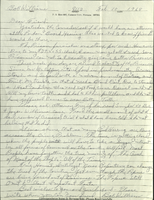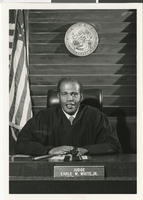Search the Special Collections and Archives Portal
Search Results
Gwendolyn Walker oral history interview
Identifier
Abstract
Oral history interview with Gwendolyn Walker conducted by Claytee D. White on July 15, 2014 for the African Americans in Las Vegas: a Collaborative Oral History Project. Walker discusses her mother founding S.W.A.P. (Students With a Purpose) and the Swapettes, the first precision drill team in Las Vegas, Nevada. Walker also talks about collecting African American memorabilia and founding the Walker African American Museum, and some notable family members.
Archival Collection

Transcript of interview with Gwen Walker by Claytee White, July 15, 2014
Date
Archival Collection
Description
Gwendolyn K. Walker arrived in North Las Vegas in 1962 from Houston, Texas, as a five-year-old with her parents, two brothers, and her cousins. The Walker family at first moved to a rented house on D Street, and Gwen attended Kit Carson Elementary School for first grade. Her mother enrolled in nursing school, so she sent Gwen back to Delhi, Louisiana, to be raised by her grandmother. In Delhi Gwen picked cotton with her aunt while she was in the second grade. Gwen returned to North Las Vegas to live with her mother and complete elementary school at Jo Mackey before matriculating to J. D. Smith Elementary School for junior high school and then to Clark High School. Later she attended UNLV. Gwen and her mother joined Saint James Catholic Church at H Street and Washington Avenue, but after she returned from Delhi she joined Second Baptist Church, where she became close with a cohort of friends that remained strong even as she experienced racism and bullying and love for the first time.
Text
Audio recording clip of interview with Greg McCurdy by Claytee D. White, August 31, 2013
Date
Archival Collection
Description
Part of an interview with Greg McCurdy by Claytee White on August 31, 2013. McCurdy talks about one of his mentors, Herman Moody, the first African American police officer in the Las Vegas Metropolitan Police Department.
Sound
Sherrill and Samuel Coleman oral history interviews
Identifier
Abstract
Oral history interviews with Sherril and Samuel Coleman conducted by Claytee White on February 12 and 22, 2016 for the African Americans in Las Vegas: a Collaborative Oral History Project. In these interviews, Sherrill and Samuel Coleman discuss experiencing violence against African Americans in Durant, Mississippi, and discuss moving to Las Vegas, Nevada during the 1990s. The Colemans later describe their contributions with the African American community and recall the poor working conditions for African Americans in Las Vegas and throughout the United States. The two then discuss social class, American Federation of Labor (AFL-CIO), and their involvement with religious organizations.
Archival Collection

Correspondence from inmates at Nevada State Prison to Flora Dungan, 1968
Date
Archival Collection
Description
Letters to Flora Dungan describe incidents and treatment of African American prisoners at the Nevada State Prison and the conduct of the warden.
Text
Ernest Fountain oral history interview
Identifier
Abstract
Oral history interview with Ernest Fountain conducted by Claytee D. White on March 27, 2017 for the African Americans in Las Vegas: a Collaborative Oral History Project. In this interview, Fountain discusses African American owned businesses and explains why these businesses are disproportionately disappearing and going out of business. Fountain then talks about the importance of understanding finance and economics, small businesses, and starting his lending firm, New Ventures Capital Development Company. Lastly, Fountain explains the process of owning a bank, and the importance of having more African American owned financial institutions.
Archival Collection
Lena Brass oral history interview
Identifier
Abstract
Oral history interview with Lena Brass conducted by Claytee D. White and Stefani Evans on January 17, 2017 for the African Americans in Las Vegas: a Collaborative Oral History Project. In this interview, Brass discusses her upbringing in Winsboro, Louisiana and describes living during segregation. She recalls moving to Las Vegas, Nevada in 1975 with her husband, her employment at Nevada State Bank, and participating in the Martin Luther King parade. Brass then talks about the advancement of banking technology, the utilization of computers, and her experience as an African American bank manager. Later, Brass talks of her mentors, her faith, and the economic downturn of Jackson Street businesses in the Westside. Lastly, Brass discusses the future of the African American community in Las Vegas, the Westside, and business networking with the church community.
Archival Collection
Jocelyn Oats oral history interview
Identifier
Abstract
Oral history interview with Jocelyn Oats conducted by Claytee D. White and John Grygo on November 30, 2012 for the African Americans in Las Vegas: a Collaborative Oral History Project. In this interview, Oats discusses her family background and living in Las Vegas, Nevada since the mid 1950s. She describes the city at the time, the Baptist church community, and the church's influence on African Americans in West Las Vegas. Later, Oats talks about the issue of drugs in the Westside community and how it has affected members in her family. Lastly, Oats describes the African American experience in Las Vegas throughout her life.
Archival Collection

Photograph of Judge Earle W. White, Jr., 1984
Date
Archival Collection
Description
Judge Earle W. White, Jr., believed to be the first African-American Deputy Public Defender in Nevada.
Image
James Walker oral history interview
Identifier
Abstract
Oral history interview with James Walker conducted by Larmaya Kilgore on November 14, 2014 for the African Americans in Las Vegas: a Collaborative Oral History Project. In this interview, Walker discusses his personal history and moving to Las Vegas, Nevada in the 1940s. He talks about his employment at the Fremont Hotel in 1966 and working on the Las Vegas Strip the following year. Walker recalls the African American experience working on casino floors, facing discrimination, and the process of integration in schools. He then describes the jobs given to African Americans at the casinos, being unable to live in certain areas of the city, and the increase of African American workers in construction. Lastly, Walker discusses his ownership of the Moulin Rouge Hotel and Casino, casino licensing, and the increase of businesses in West Las Vegas.
Archival Collection
